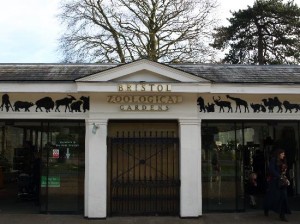Bristol Zoo’s shock decision to quit its iconic Clifton site and relocate to the city’s outskirts has been supported by Bristol Chamber of Commerce.
The 12-acre Bristol Zoo Gardens near The Downs has been home to the Bristol Zoological Society for nearly two centuries and is one of the city’s most-visited attractions. 
Last Friday the Society took the city’s tourism industry by surprise by announcing that it is to sell the lucrative site and move its staff and animals to the Wild Place Project, the 40-acre area near Cribbs Causeway is has operated as a wildlife conservation park for the past seven years and is already home to animals including giraffes, bears, wolves and zebras.
The site has potential to expand to 136 acres. The zoo, which last year had 830,000 visitors, employs 250 staff and 300 volunteers.
The Society said the move was to create a world-class zoo and to safeguard the future of the organisation, which had already made an operating loss in four of the past six years before the devastating impact of Covid-19.
Bristol Chamber of Commerce & Initiative chief executive James Durie said the importance of the zoo, its worldwide research, education and wildlife-sustaining role, as well as its attraction for visitors to the city and region was almost unmatched.
“The need to safeguard its future and develop new forward-thinking approaches for its vital work will clearly be better achieved on the Wild Place Project site,” he said.
“We believe this decision enables the Bristol Zoological Society and the community which it supports to take this forward and grow this activity by creating new modern, spacious facilities for education, conservation and for the animals, enabling more people to enjoy and benefit from the brilliant work they do.
“The impact of Covid-19 has undoubtedly emphasised the need to act now and we look forward to offering our help and support through the very significant period of change ahead, including helping ensure an appropriate legacy for the Clifton site.” 
Mayor of Bristol Marvin Rees also supports the move, saying it presented the city with a unique opportunity to develop homes on the high-profile site.
“I am reassured about the zoo’s commitment not only to working with the council, but also ensuring that any potential developer understands the need to retain and protect the gardens, only builds where buildings have stood and includes affordable housing on the site – something which is hard to come by in Clifton,” he said.
Bristol Zoological Society chief executive Dr Justin Morris said 2020 had been by far the most challenging year the society had faced in its 185-year history.
“But for many years Bristol Zoo Gardens has been struggling with fundamental and persistent challenges. Namely an inability to meet the changing needs of the animals within the available space and infrastructure, and declining visitor numbers.
“These challenges have had an enormous impact on our finances and the impact of Covid-19 has caused us to radically rethink our plans about the future and how we address the fundamental and persistent challenges that we face in order to save Bristol Zoological Society.
“This new strategy presents an opportunity to create a world-class zoo that sets the standard for a modern, forward-looking zoo in the 21st century.”
“It will be an inspiring, immersive wildlife experience with conservation and sustainability at its heart, where animals will have the space and facilities to thrive.
“New exhibits will link visitors to our conservation projects around the world and provide the tools for visitors to become conservationists themselves.
“The new Bristol Zoo will also be a beacon of environmental sustainability, demonstrating and promoting how together we can save wildlife in the way we live our lives.”
The Clifton site is expected to close to visitors in late 2022, with the new zoo opening at the Wild Place in 2024.






























